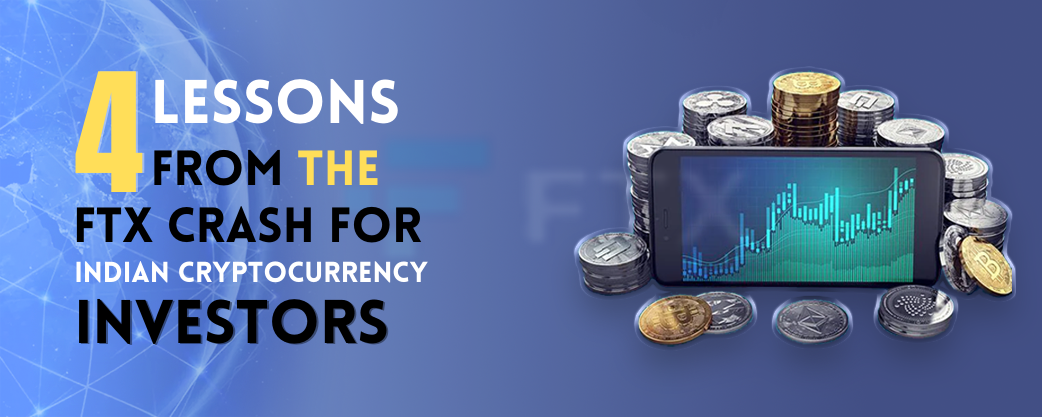Four lessons From the FTX Crash for Indian Cryptocurrency Investors
 Introduction
IntroductionThe FTX collapse has caused many people to panic sell, leaving some investors wondering what to do next. In this article, we will see that there are actually four lessons for all Indian cryptocurrency investors that will help you protect your crypto portfolio from any future FTX collapses.
The current focus of the financial press is largely on the FTX story and Sam Bankman-unethical Fried's and criminal behaviour. with justification. The real-life situation is reminiscent of Long-Term Capital Management, Enron, Tyco, Lehman Brothers, and Bernie Madoff. But in a broader sense, we quietly reached the crypto peak's one-year mark.
It reached an all-time high of $69,000 on Nov. 10, 2021. Since then, all digital assets—including major coins, alternative currencies, and stablecoins—have experienced extreme volatility and suffering trade. Investors are left wondering what to do with (and where to keep) their valuables as a result of the bankruptcy of cryptocurrency lenders and purported exchanges.
There are The following lessons should be kept in mind by the crypto investors after the FTX crash for India-
We require a legal system that can both safeguard users and encourage innovation. The current system of enforcement-based regulation must change. To produce legislation similar to the 1996 Telecommunication Act, which established the circumstances for innovation to flourish responsibly, policymakers and business leaders can collaborate.
Any new regulations must make a distinction between the technology and the businesses that create the services that are built on top of it. Consider the Internet as a model; neither network time nor HTTP are governed by us (aka the web). However, we do make an effort to oversee companies like Amazon, Internet service providers like Comcast, and platforms like PayPal that make use of those protocols.
Authorities need to realise that excessive centralization in crypto business intermediaries, which hide their decision-making and financial health from the public, is the real problem in the case of catastrophes like FTX, not decentralisation.
We need a legal framework that can both protect people and promote innovation. It is necessary to alter the current enforcement-based regulatory framework. Policymakers and industry leaders may work together to create legislation that is comparable to the 1996 Telecommunication Act, which created the conditions for innovation to flourish responsibly.
Any new laws must distinguish between the firms developing the technology and those building the services that are built on top of it. Take the Internet as an example; neither HTTP nor network time are controlled by us (aka the web). We do, however, make an effort to monitor organizations that use such protocols, like Amazon, Comcast, and platforms like PayPal.
Let's stop idolising the centralised company CEOs who founded cryptocurrencies. The truth is that middleware like FTX does not necessarily need to rule the market. The fact that Web3 is permissionless and decentralised, allowing anybody, anywhere, to own digital assets, manage them peer to peer, and participate in their governance, is ultimately what makes it so appealing.
This was first made possible by Bitcoin, and it has since been greatly accelerated by Ethereum and DeFi applications. To be fair, FTX provided a fantastic user interface and experience, but it lacked enough governance, improved risk management, and greater transparency.
Businesses like FTX have provided crucial on-ramps to this asset class and the larger Web3 market, and they may continue to do so. But an industry shouldn't be defined by its entrance points. Currently, 50% of all volumes for crypto assets are held by Binance. Although we may today praise it for having survived, this kind of concentration should frighten everyone.
We must assist businesses who want to use open blockchains for Web3 development. Many large businesses are prepared to switch to Ethereum and other open infrastructures after years of experimenting with closed systems like permissioned blockchains and other closed systems.
Although such platforms were unable to add value, they did allow those businesses to become familiar with the technology. Now let's construct more onramps so they may utilise this public infrastructure for practical, commercial uses.
NFTs are a wonderful place to start because they can "red-pill" a large company on Web3 and pave the way for other developments.
More corporate innovation in this area will benefit Web3 users and developers, but investors will also gain from it. After all, if hundreds of businesses use this technology, they'll probably need to own the underlying asset as well in order to maintain a node and pay for gas fees, and other costs.
Conclusion
Finally, it is important to recognize that while self-custody may be a benefit for some, it poses a considerable barrier to Web3 adoption for others. This indicates that people still require dependable service providers in this area. Many users have a valid fear of holding their own assets because the technology tools of Web3 are not intuitive to everyone.
The goal of Web3 was to eliminate "too big to fail" intermediaries. FTX is exactly what Satoshi Nakamoto, the person who created Bitcoin, was trying to avoid: a centralised organisation that utilised its power to take unreasonably high risks in an unregulated market. Retail ultimately paid the highest price.
We need to leave this crisis with a reinvigorated commitment to regulating centrally controlled financial intermediaries, regardless of the technology they employ, as well as to creating safe, straightforward, decentralised tools using open protocols.
A common rumour in the cryptocurrency community is that whether or not an altcoin is listed on an exchange like Bittrex or Binance, larger exchanges like FTX, Kraken, Poloniex and others do affect the price of that coin. The FTX crash was a stark warning to all investors who had invested in FTX and a big lesson that they should not blindly trust cryptocurrency exchanges.












